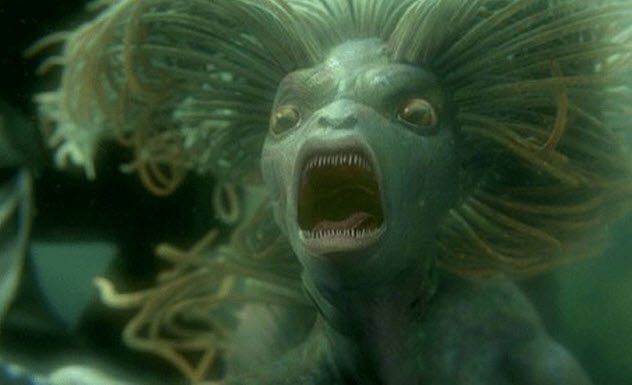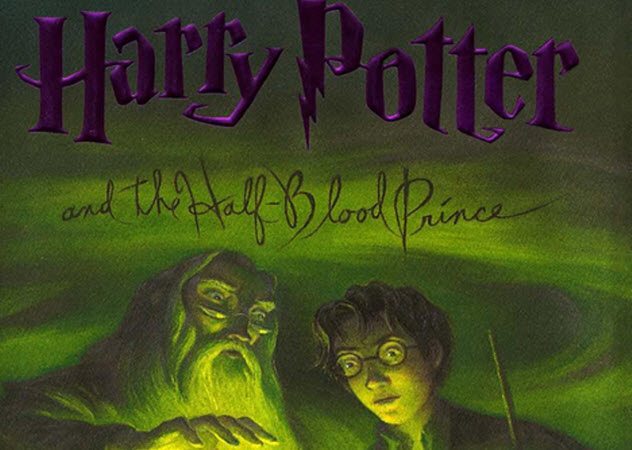 Movies and TV
Movies and TV  Movies and TV
Movies and TV  History
History 10 Dirty Government Secrets Revealed by Declassified Files
 Weird Stuff
Weird Stuff 10 Wacky Conspiracy Theories You Will Need to Sit Down For
 Movies and TV
Movies and TV 10 Weird Ways That TV Shows Were Censored
 Our World
Our World 10 Places with Geological Features That Shouldn’t Exist
 Crime
Crime 10 Dark Details of the “Bodies in the Barrels” Murders
 Animals
Animals The Animal Kingdom’s 10 Greatest Dance Moves
 Movies and TV
Movies and TV 10 Box Office Bombs That We Should Have Predicted in 2025
 History
History 10 Extreme Laws That Tried to Engineer Society
 History
History 10 “Modern” Problems with Surprising Historical Analogs
 Movies and TV
Movies and TV 10 Movie Adaptations That Ruined Everything for Some Fans
 History
History 10 Dirty Government Secrets Revealed by Declassified Files
 Weird Stuff
Weird Stuff 10 Wacky Conspiracy Theories You Will Need to Sit Down For
Who's Behind Listverse?

Jamie Frater
Head Editor
Jamie founded Listverse due to an insatiable desire to share fascinating, obscure, and bizarre facts. He has been a guest speaker on numerous national radio and television stations and is a five time published author.
More About Us Movies and TV
Movies and TV 10 Weird Ways That TV Shows Were Censored
 Our World
Our World 10 Places with Geological Features That Shouldn’t Exist
 Crime
Crime 10 Dark Details of the “Bodies in the Barrels” Murders
 Animals
Animals The Animal Kingdom’s 10 Greatest Dance Moves
 Movies and TV
Movies and TV 10 Box Office Bombs That We Should Have Predicted in 2025
 History
History 10 Extreme Laws That Tried to Engineer Society
 History
History 10 “Modern” Problems with Surprising Historical Analogs
10 Disenchanting Lawsuits Involving ‘Harry Potter’
As one of the world’s most recognizable brands, Harry Potter has spawned books, movies, plays, games, and theme parks. With the movies grossing $7.2 billion at the box office and the books bringing in an even bigger $7.7 billion in sales, J.K. Rowling quickly became the richest Brit in the world, overtaking the likes of Richard Branson and the queen.
But where the money goes, the lawsuits will follow. From shameless fraudsters to adoring fans, countless people have tried to cash in on this moneymaking machine. So from the somewhat questionable to the downright outrageous, here are 10 lawsuits involving the Harry Potter franchise.
10 Nancy Stouffer

US author Nancy Stouffer first heard about Harry Potter in 1999, two years after the first book had been published. Apparently, she was immediately horrified. Not only had Rowling blatantly and shamelessly hijacked the term “Muggles,” she had just barely altered the name of The Boy Who Lived from one of Stouffer’s characters, Larry Potter.[1]
Stouffer’s characters came from a series of booklets she had produced in the late 1980s as part of what were intended to be monthly activity packages for children. Only two were ever produced, none were ever sold, and their similarities to the Harry Potter series could be generously described as “almost coincidental” at best.
One booklet, The Legend of Rah and the Muggles, featured a race of tiny, hairy mutants called muggles that never exceed 51 centimeters (20 in) in height and ride around on bees. Larry Potter and His Best Friend Lilly was a coloring book about a boy who was sad because he needed to get glasses.
Stouffer set up another publishing company in 2001 to republish her works under the name “N.K. Stouffer” and then sued J.K. Rowling. Rowling’s lawyers quickly ripped the case to shreds because the stories are nothing alike and they found a pattern of serious fraud on Stouffer’s side.
She failed to produce any evidence of the original works, and they found out that Larry was only referred to as “Potter” in one paragraph. That paragraph was written in a different font than the rest of the story, a font that hadn’t been invented in the 1980s.
Furthermore, The Legend of Rah and the Muggles seems to have originally been called Rah, with the other words added afterward. The printers employed in this case were not capable of producing the font used for the other words.
Stouffer was fined $50,000, and her case was thrown out. She appealed and lost again. However, she said that she was still considering legal action in 2006. Since then, she has not filed any more lawsuits against Rowling.
9 Willy The Wizard

Another story that Rowling had allegedly decided would be the perfect victim was the tale of Willy the Wizard by Adrian Jacobs. Unfortunately, it was not Jacobs himself who alleged plagiarism but his family.
Jacobs had been dead for 12 years when they brought suit in 2009. Even though Rowling had already become a billionaire with her worldwide phenomenon, his estate claimed that she had stolen large elements of The Goblet of Fire from Willy the Wizard.
The elements that were allegedly stolen included a wizard contest in which competitors had to rescue a hostage from half-human, half-animal creatures. In Harry Potter, they were mermaids. In Willy, they were kangaroo centaurs.
They also play wizards’ chess, read wizards’ newspapers, and visit wizards’ prison. However, the “prison” in Willy the Wizard was more of a beach called Banish Bay. Also, both books featured trains. The case was thrown out in 2011.[2]
8 eBay And eBooks

Ebooks have been a great addition to the publishing industry, allowing readers from anywhere in the world to quickly and affordably access almost any book they want. The problem is that it is much easier for anyone with a computer to produce copies of books and sell thousands of them without investing in some of the more expensive aspects, such as printing or acquiring the author’s permission.
In 2004, J.K. Rowling had this problem with Baazee.com, the Indian arm of eBay. While Baazee itself had not created the ebooks, it was allowing a number of users to host pirate copies of the Harry Potter series.[3]
Rowling was awarded a strange, sort-of injunction against the site, which stated that they would be forced to remove the unauthorized ebooks unless they did so voluntarily. While an order like that doesn’t really leave much room for voluntary action, the ebooks, sellers, and related advertisements were all removed from the site.
7 Harry Potter And Bao Zoulong

Speaking of The Goblet of Fire, who could forget that ending? The Dark Lord has returned! For years, fans waited with bated breath, only to finally open the fifth book and be greeted by the glorious first paragraph.
“Harry doesn’t know how long it will take to wash the sticky cream cake off his face. For a civilized young man, it is disgusting to have dirt on any part of his body. He lies in the high-quality china bathtub, keeps wiping his face, and thinks about Dali’s face, which is as fat as the bottom of Aunt Penny.”[4]
At least, these were the words that would greet you if you were unfortunate enough to purchase the fraudulent 2002 Chinese installment. Originally mistranslated by Western media as Harry Potter and Leopard Walk Up to Dragon, Harry Potter and Bao Zoulong was quickly revealed to be a fake fifth installment written by an anonymous author.
In it, Harry is transformed into a magicless dwarf who has to battle a dragon. It soon became apparent that most of the book was J.R.R. Tolkien’s The Hobbit with the names changed. Needless to say, fans of the franchise were not fooled by the poor imitation and the publishing house responsible for this monstrosity was ordered to pay a measly £1,600 (US$3,400) fine.
6 Claire Field

The benefit of having the support of a large, multinational corporation is that they can—and will—take down anyone who steps on your toes in even the slightest way. The downside of this is that they sometimes send their gargantuan army of lawyers after a 15-year-old girl. This is what happened in 2000 when they set their sights on Claire Field just a few days before Christmas.
Claire was such a fan of the Harry Potter books that she ran her own website, harrypotterguide.co.uk. But with the first film due to be released the following year, Warner Brothers decided to buy up any domain name with “harry potter” in it, which resulted in them sending a threatening letter to the young girl.[5]
The story soon made headlines in Britain, and Warner Brothers backed down. Despite having had back-and-forth communication with the girl’s father, Warner Brothers claimed that media pressure had not impacted their decision and the whole thing had been a clerical error.
5 Harry Potter Lexicon

Claire Field wasn’t the only owner of a Harry Potter fan site that butted heads with J.K. Rowling. In 2007, RDR Books was planning to turn the Harry Potter Lexicon website into an encyclopedia-type book that would list the spells, potions, creatures, and characters featured in the novels.
Despite having previously praised the site and its owner, Steve Vander Ark, Rowling said that she had plans to publish a similar book and could not support a fan doing so “for their own personal gain.”
In 2008, a Manhattan judge blocked the book’s publication on the grounds that there was not enough original commentary and the book was simply placing Rowling’s words in a different order. He also awarded Rowling and Warner Brothers $750 for each of the seven novels and the two companion books, Quidditch Through the Ages and Fantastic Beasts and Where to Find Them. This increased the net worth of the franchise by a whopping $6,750.
Vander Ark did eventually publish a shortened version of his book, with the word “unauthorized” clearly on display in the title.[6]
4 Wyrd Sisters

There are so many “bands” these days that coming up with an original name can be difficult. This is particularly true if the band is a background feature mentioned in passing a grand total of four times. So you could forgive J.K. Rowling for not overthinking things and going with the not-too-imaginative name “Weird Sisters.”
Winnipeg folk band, The Wyrd Sisters, was not in such a forgiving mood. After being offered $5,000 for the right to use the name by producers of the film, the Canadian band shot back with a $40 million lawsuit.
Despite spelling the name differently, the fact that the band had been acknowledged by the film’s producers gave them some ground to accuse Warner Brothers of copyright infringement. The lawsuit lasted five years before being settled out of court for an undisclosed amount.[7]
3 Asda vs. Bloomsbury

The most important rule in business is to provide consumers with a product or service you know they want, so stocking the final Harry Potter book seems like a no-brainer. But the second most important rule is to make a profit. So when supermarket chain Asda announced that they would be selling their 500,000 copies for £8.97 instead of the recommended retail price of £17.99, things quickly got nasty.
In a scathing press release, Asda accused the book’s publisher, Bloomsbury, of “holding children to ransom.” Bloomsbury threatened that Asda could be sued for libel. Then, in a move that had nothing to do with Asda’s press release or pricing, Bloomsbury decided just a few days before the book’s release to cancel the order, citing unpaid bills somewhere in the region of £38,000.
Asda hit back, claiming that Bloomsbury also owed them £122,000. But with just days to go before the release of one of the biggest books in decades, Asda came crawling back with its tail between its legs. As well as paying their outstanding bills, they issued a press release apologizing “unreservedly” for their previous statement and the two companies became friends again.[8]
2 Right To Read

When releasing something as highly anticipated as a new Harry Potter book, keeping the plot a secret is paramount. So when 14 copies of Harry Potter and the Half-Blood Prince were accidentally sold in Canada before the official release date, Rowling and her lawyers sprang into action. However, their legal proceedings were not directed at the store that had mistakenly sold the books but at the fans who had bought them.[9]
The Supreme Court of British Columbia quickly issued an order prohibiting anyone who had purchased the book from selling, showing, or even reading the book before the official release date. This kicked off a major public debate about the “right to read.” While one side argued that, like a personal diary, people are not entitled to read a book that had not been acquired legally, the other side argued that the courts cannot prevent people from reading something they have in their possession.
A similar mishap occurred with the release of the final book, Harry Potter and the Deathly Hallows, when two distributors dispatched some copies early. In the end, no punitive damages were sought in either case.
1 Aaron Lambert

While some copies of the books have been sold before their official release date by accident, Aaron Lambert thought he could make a pretty penny by selling copies of Harry Potter and the Half-Blood Prince to the press over a month before its official release date.
Lambert had access to the books through his job as a security guard at a warehouse and made off with two of the 10 million copies that were being stored there. Then he contacted reporters from the Daily Mirror and the Sun and negotiated deals worth a total of £80,000 (US$111,250).
One of the reporters, John Askill, agreed to meet Lambert but actually planned to steal and return the books to J.K. Rowling. But when Askill tried, Lambert fired a fake gun, which led to the police showing up and arresting him.
After being released on bail, Lambert then tried to blackmail the publishers. But he was arrested again and sentenced to four-and-a-half years in prison for theft as well as firearm and blackmail offenses.[10]
Simon can be followed on Twitter here.
Read more bizarre stories about Harry Potter and other iconic characters on 10 Iconic Characters Nearly Ruined By Their Creators and 10 Outlandish Theories That Change How You See Classic Books.








